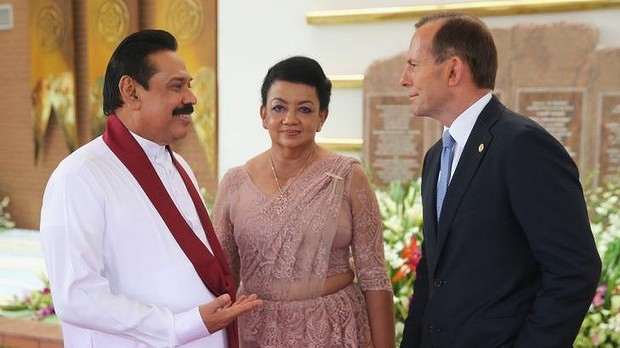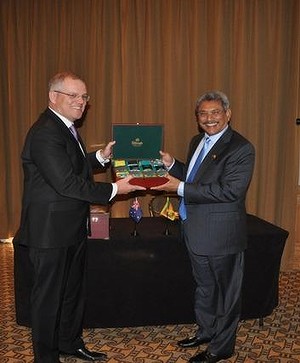Sarah Whyte
Immigration correspondent

Wednesday, 7th May 2014

All smiles: Mr Abbott with Sri Lankan President Mr Mahinda Rajapaksa and his wife. Photo: Getty Images
The Sri Lankan government has publicly thanked Australia for its "bold" decision not to co-sponsor a UN resolution to investigate alleged human rights abuses in the south Asian nation.
According to a statement by the Sri Lankan high commission, Sri Lanka thanked Australia for the ‘‘bold decision of not co-sponsoring this year’s human rights resolution on Sri Lanka’’.
Immigration Minister Scott Morrison and the head of Operation Sovereign Borders, Lieutenant-General Angus Campbell, welcomed a Sri Lanka delegation, including Defence Secretary Gotabaya Rajapaksa, formally invited by the federal government.

Defence secretary Mr Gotabaya Rajapaksa with Mr Morrison. Photo: Getty images
"[The] government of Australia considers accountability and human rights concerns should be addressed within an internal mechanism and not by any international investigation as suggested by other countries," the high commission statement said.
"[The] Australian side indicated that they would render all possible assistance to Sri Lanka in this regard," it said.
Foreign Affairs Minister Julie Bishop then met with the country's External Affairs Minister Professor G.L. Peiris. During their meeting, Mr Peiris also thanked Ms Bishop for her understanding of the "Sri Lankan situation", and for declining to co-sponsor the Resolution against Sri Lanka at the Human Rights Council in March, the high commission said in a separate statement.
A spokeswoman for Ms Bishop said the meeting between the two ministers was confidential.
"The Australian Government has a well known policy of engagement with the Sri Lankan Government and a constructive and diverse relationship with Sri Lanka. We continue to work closely with the Sri Lankan Government on a range of matters," she said.
International lawyers have strongly condemned the delegation meeting, saying it was a distraction to the country's gross human rights violations - including forced abductions, torture, and extrajudicial killings by state forces, land seizures by the military and oppression of political opponents that plagued Sri Lanka during the 26-year civil war that ended in 2009.
“The visit shows the price this Government is willing to pay in its one-eyed obsession to stop the boats," said Emily Howie, director of Advocacy and Research Human Rights Law Centre. "Not just silence on ongoing human rights abuses in Sri Lanka, but a concerted effort to stifle international efforts at justice for victims of war crimes and crimes against humanity,” Ms Howie said.
Ms Bishop voiced her opposition to an international investigation into the alleged war crimes in March, saying she was not convinced that the UN-backed inquiry was "the best way forward", refusing to co-sponsor the UN's independent investigation.
During November's Commonwealth Heads of Government Meeting, Australia did not join other major countries that crtiticised the regime's human rights abuses. Both India and Canada boycotted the meeting, while the United Kingdom's prime minister David Cameron publicly condemned the regime. In contrast, Prime Minister Tony Abbott presented the government with two patrol boats.




